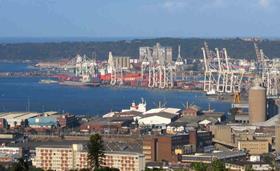
The South African citrus industry is taking a landmark step this week in supplying the Chinese market when the first break bulk reefer, Baltic Summer, completes loading in Durban.
The vessel is expected to sail on Friday 10 May or Saturday 11 May, and will arrive at its first port of call in Japan in about ten to twelve days.
The Citrus Growers’ Association (CGA) logistics development manager Mitchell Brooke said the first sailing follows an agreement with China to allow break bulk shipments. “This is a game changer for us in our supplies to China,” he said.
He said the vessel will discharge in ports in Japan and China, which fits in with the protocol of 24 days cold sterilisation required for China.
“The steri requirements for Japan is shorter and we can therefore deliver to Japan first while the fruit for China still completes the protocol requirements,' Brooke said.
Once the Baltic Summer is on the high seas it will first head to Osaka in Japan and then proceed to Tokyo. “It should be arriving in Shanghai at the time when the steri is completed,” Brooke told Fruitnet.
He said this is also the first significant shipment of grapefruit of the season to Japan. “In total there will be 5,200 pallets on the vessel, of which only 600 pallets is destined for China.”
Brooke added, however, that shipments to China are expected to increase considerably in future. “Over the past few years we have seen considerable growth in China, and this bodes well for developing out business in China,' he said.
This latest development follows rigorous negotiations and the signing of a protocol between the South African government and China. The protocol also allows co-loading of China shipment with consignments for Japan and or South Korea in separate compartments.
The South African government clearly views Baltic Summer's departure as of high importance. The Minister of Agriculture, Forestry and Fisheries, Senzeni Zokwana, as well as the deputy minister, Sfiso Buthelezi, visited the port of Durban yesterday (6 May) to view the loading activities. “This is clearly a sign of the support we have from the Ministry,” Brooke said.
Brooke said one of the main reasons for moving to break bulk shipments is because the South African port company, Transnet Ports, has failed to respond to dealing with inefficiencies, delays and not supplied enough facilities to deal with loading of containers. “Because of their policies we virtually have only one day to fill containers and deliver them to the port for loading on vessels,' Brooke said.
“The result is that containers arrive too late, miss the vessels and this is very problematic for our export programme. That is why we are so excited about this development,” he said.
Brooke paid tribute to exporters Zest-Komati who are leading the charge amongst South African exporters into break bulk shipments to Asia. “We are certain that South Korea will also be included in the package in future which will allow us to optimally service these markets,' he said.
He added that, with the growth in citrus production in South Africa, it is imperative South African exporters come up with new initiatives to ship and supply markets effectively.
“We have a lot of problems with reported freezer damage and steri failures in containers, and it is much easier to handle the protocols effectively in bulk reefer shipments,' he said.
Both the reefer terminals in Durban have committed to participate in these shipments, but the first vessel is loading and will depart from the Mayden Wharf Terminal.



